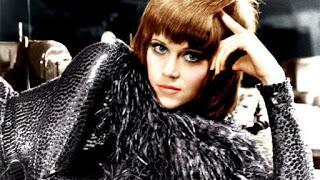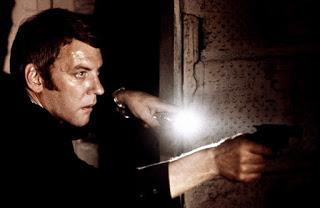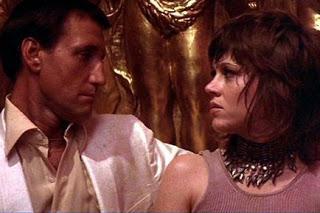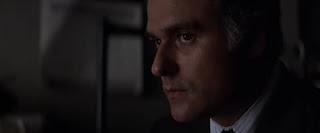
"Don't feel bad about losing your virtue... Everybody always does."
In her early work, Jane Fonda seemed little more than ditzy showbiz offspring, suited to breezy comedies (Barefoot in the Park) or the occasional farce (Barbarella). Then came They Shoot Horses, Don't They? (1969), proving her more than Henry Fonda's daughter. She also became active in radical politics, from her marriage to Tom Hayden to her infamous visit to North Vietnam in 1972. She remains polarizing today, with Americans torn whether to memorialize her on tote bags or urinal cakes.Very much a woman of her time, Fonda fumbled towards forging a distinct identity through self-expression, often in provocative or embarrassing ways, but with an earnestness that's hard not to respect. Alan J. Pakula's Klute (1971) gave Fonda her first Oscar win, providing her a chance for a remarkable, career-defining performance.
Pennsylvania policeman John Klute (Donald Sutherland) is hired by businessman Peter Cable (Charles Cioffi) to investigate the disappearance of mutual friend Tom Gruneman. Klute's only lead takes him to Bree Daniels (Jane Fonda), a New York call girl with a passing acquaintance to Gruneman. Initially hostile to Klute, Bree gradually warms to the detective, helping him with his investigation. Especially when it turns out that Bree's being targeted by a nefarious stalker.
Though Klute's packaged as a thriller, its "mystery" is the least interesting part. Pakula and writers Andy and Dave Lewis reveal Cable as their villain early on, acting with the stumbling rashness and convenient loquacity of a Hitchcock villain. Further, the plot often meanders into slice-of-life and character scenes. Which isn't a bad thing, given how compelling the latter is, but anyone expecting a forerunner of Pakula's All the President's Men should look elsewhere.

Through the occasionally creaky device of meeting with a psychiatrist (Vivian Nathan), Bree spills out neuroses born of a life being subjected to male desires. She beds a high-paying businessman, looking at her watch as they make love. One of her preferred clients is an old tailor (Morris Strassberg) who prefers loquacious storytelling to actual sex. In moments of despair, she lashes out at Klute with foul language or even scissors, and falls into the arms of her old pimp Frank (Roy Scheider). She's profoundly messed-up, yet tough and extremely sympathetic.
Hence, Klute's earnestness baffles and frustrates her. At first, she views the detective as an interloper, then as a test: she repeatedly tries to seduce him, and when she finally succeeds mocks him for square hypocrisy. Nonetheless, Klute proves far more attentive than her usual johns, comforting her after a drug trip and resolutely safeguarding her against her stalker. Bree develops affection, if not actual love for Klute, and is disgusted with herself for not knowing how to react. Could it be that someone actually respects her, without judging her profession or exploiting her body? Weird that it would be a Pennsylvania hick, but films make strange bedfellows.

If Klute fumbles its mystery elements, Pakula's direction more than compensates. Gordon Willis' photography strikes a unique aesthetic, constantly isolating Bree in the shadows of hotel rooms, apartments and shops, her bright clothing and candlelight clashing with drab surroundings. He indulges in an intoxicating long take when Bree visits Frank's nightclub, and films Cable through translucent veils - a hand grasping at a rain-soaked window, a grim face reflected on a table, his final appearance through a clothing sheet. It's enhanced by Michael Small's unnerving score, mixing mellow jazz for intimate scenes with an off-kilter piano and chorus tune denoting Cable's madness.
Jane Fonda gives an utterly captivating performance. She plays to her sex kitten image (especially a glittering blue sequin dress) while undercutting objectification through bold acting choices. She invests Bree with a constant, unrelenting haughtiness, meshing her vulnerabilities with a forceful, independent personality. She's especially impressive in the finale, trying to bullshit her way past Cable's attentions and weeping silently as he plays an incriminating tape. But really, Fonda's just as compelling puttering around her apartment as she is making love to Klute or fighting the killer.

Frankly, Klute shows a far more nuanced portrait of female agency than most modern movies. Today's "strong female characters" tend to dispense snark and wield firearms rather than showing actual personalities. All the more credit, then, to Jane Fonda for making a messed-up call girl one of cinema's most compelling feminists.

